|
The Swahili term baraza describes informal meetings and regular discussion rounds among neighbours and friends that occur in everyday street life on the Swahili coast, usually in front of houses and in a casual atmosphere. The term also signifies the location where these gatherings commonly take place: the stone benches on the outer walls of houses in East African coastal towns. These gatherings give locals the opportunity to communally discuss, interpret and question any topics of interest to the attendees and may include the latest news and gossip as well as cultural topics, and religious and political conversations and discussions. In this spirit, the baraza constitutes a place and time for the exchange of knowledge within a familiar social context.
The ZMO-baraza is a Swahili-speaking meeting point, a kind of jour fixe for Swahilophone researchers, advanced students and interested members of the public. Each meeting is ranked around a talk or presentation that may be more or less academic in character; from research papers to biographical accounts a broad range of topics can be covered in this ongoing series of informal discussions. On the one hand, as a platform for academic exchange on research-related topics, the ZMO-baraza is open to contributions in disciplines ranging from linguistics, literature and history, over to political science, philosophy and social anthropology. It thus acts as a platform for the presentation and discussion of research as well as literary documentation and translation. On the other hand, the ZMO-baraza offers a space for literary and biographical presentations by East African authors, poets and other personalities, and for discussions with them.

The very first ZMO-baraza took place in July 2008 with two prominent guests from Kenya: The Kenyan poet Ustadh Ahmad Nassir who recited a selection of his poems and the former politician and Islamic scholar, Sheikh Abdilahi Nassir who gave a speech on “Kenyan Muslims and the Righting of Historical Injustices: the Case of Mwambao”  . .

Baraza - events 2011/12
Since the winter term 2009/10 the ZMO-baraza has been jointly organized by Kai Kresse (ZMO, Berlin) and Lutz Diegner (Humboldt University, Berlin). Unless otherwise announced, it takes place at the ZMO every first Thursday of the month at 4pm.

Thursday, February 2nd, 2012, 4 pm, ZMO
“Sijui unataka kitu gani juu ya maisha yangu” – I don’t know what you want to know about my life
Baraza with Sauda Ali Barwani (formerly University of Hamburg)
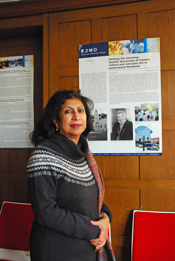 |
|
Mwalimu Sauda Ali Barwani, known to many of us as former Lecturer of Swahili at the University of Hamburg, presented her research on autobiographical texts and the Zanzibar revolution in the context of the SFB 520 „Umbrüche in afrikanischen Gesellschaften und ihre Bewältigung“ (“Upheavals in African societies and their overcoming”). Research results, in form of extended interview have been published in the bi-lingual book Unser Leben vor der Revolution und danach - Maisha yetu kabla ya mapinduzi na baadaye (Our life before the revolution and thereafter; Rüdiger Köppe Verlag, 2003). A second volume documenting further research materials is to follow. Out of more than forty interviews conducted with witnesses of the revolution, Mwalimu Sauda introduced us to selected individual cases with people whom she knew well and presented some remarkable results of her research. |
She gave us insights into personal experiences of the interviewees, their special contexts of life, and she elaborated upon methodological and conceptual challenges of the research project and the translation work connected to it. |

Tuesday, Januar 3rd, 2012, 4 pm, HU
Mitandao ya Waislamu baina ya Ziwa la Tanganyika na pwani, miaka 1920-1960 – Muslim networks between Lake Tanganyika and the Indian Ocean, 1920-1960
Baraza with Katharina Zöller (Bayreuth International Graduate School of African Studies)
Katharina Zöller reported on the proposal of her dissertation project about Muslim networks between the Indian Ocean and Lake Tanganyika, which is focused on using the “Wanyema Connection”. She vividly explained her approach to these transnational networks based on historical maps, images and archive material such as written correspondences and diaries. We learned about the challenges of her research, about encounters with interlocutors and about the inspection of research material in archives in Tanzania, Great Britain and Germany. |
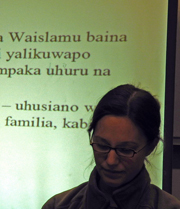
|
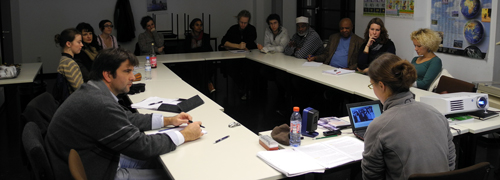 |

Tuesday, December 6th, 2011, 4 pm, HU
Kuhusu utenzi 'Wasiya wa Mabanati' na maisha ya jamii pwani – About the poem 'Wasiya wa Mabanati' and the life of coast dwellers
Baraza with Jasmin Mahazi (Berlin Graduate School for the Study of Muslim Cultures and Societies) und Kai Kresse (ZMO, Berlin)
Jasmin Mahazi and Kai Kresse gave insights into the Utenzi-poem “Wasiya wa Mabanati”, written by Ustadh Mahmoud Mau in the year 1974. The poem describes the tragic story of a girl, who gave in to the courtship of a young man and, having become pregnant, suffered grave consequences when he suddenly dropped her. At the end of the 1990s a locally produced cassette recording of this poem became very popular and was circulated among the coastal population. Touched by the tragic story, people were also fascinated by the recitor’s artistic performance. |
|
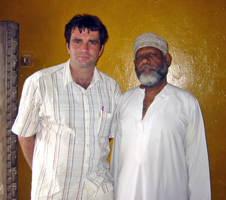
|
Jasmin Mahazi and Kai Kresse played two different recorded versions of the poem, introduced the social setting of Lamu, and contextualised the performance and reception of poem with regard to relevant backgrounds and readings. Also, a biographical sketch of the author Ustadh Mahmoud Mau, who is simultaneously an Imam, religious teacher, baker and poet, was integrated, as well as conversations with him, in order to portray the creation of “Wasiya wa Mabanati”, and to discuss it in social context.
Wasafiri Special Feature by Kai Kresse: Enduring relevance: Samples of oral poetry on the Swahili Coast |

Thursday, November 3rd, 2011, 4pm, ZMO
Utafiti katika sinema ya Kijerumani: Taxonomizing the German-African cinematic sub-genre. How Germany narrates Africa through film
Baraza with Shikuku Emmanuel Tsikhungu (Free University of Berlin)
Shikuku Emmanuel Tsikhungu presented insights into his research project in the framework of his dissertation. He gave us an overview over different models of film analysis and provided an historical review on the German production of “African films”. Referring to film examples like Die weiße Massai, Kein Himmel über Afrika, Dschungelkind and Die Serengeti darf nicht sterben he reported about the character and frequency of staged othering, of ‘German’ plots at ‘different’ sets, the staging of cultural differences as well as the historic development of cinematic representation over time. |
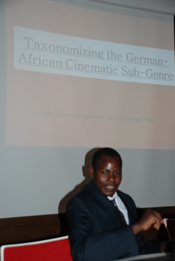 |

|